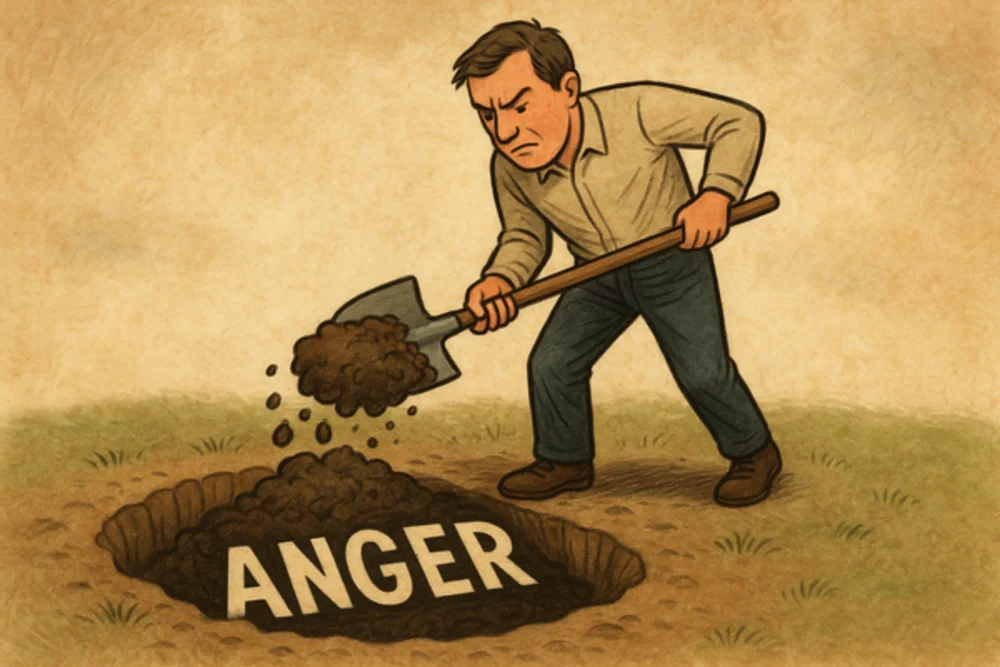Repression and anger
When experiencing an emotional state, you have, broadly speaking, three choices. You can express, suppress, or repress it. Suppression occurs when you consciously choose not to express your emotional state. In contrast, while it can be conscious, repression is essentially an unconscious inhibition of emotional expression. Some people are prone to repressing their emotions, especially negative emotions.1Garssen, B. REPRESSION: FINDING OUR WAY IN THE MAZE OF QUESTIONNAIRES. They’re said to have a repressive coping style.2Myers, L. B., Vetere, A., & Derakshan, N. (2004). Are suppression and repressive coping related?. Personality and Individual Differences, 36(5), 1009-1013.
One of the negative emotions that commonly gets repressed is anger. It’s not that people with repressed anger don’t get angry. They’re just good at not expressing their anger.
Repression of anger is not the same as anger management. Managing emotions requires being conscious of them. Repression of anger happens automatically for most people. It’s not a choice.
What causes it?
Mainly, a mixture of childhood trauma and societal conditioning. If you repress anger, you likely have negative subconscious associations with expressing anger. That means, when you expressed anger in childhood, it was likely dismissed, minimized, or invalidated. Or you faced a negative consequence, such as your parent getting angry at you for expressing anger. As a result, you learned:
“Expressing anger isn’t safe or comfortable. It ruins relationships.”
It’s part of the fawn response to trauma.3Owca, J. (2020). The association between a psychotherapist’s theoretical orientation and perception of complex trauma and repressed anger in the fawn response (Doctoral dissertation, The Chicago School of Professional Psychology). People who repress anger are also people pleasers. Their kindness stems not from a genuine desire to be kind, but from a fear of upsetting others.
Additionally, living in a society that discourages the expression of negative emotions, such as anger, also contributes to the repression of anger. People who ‘lose it’ when they get angry are generally seen as weak and out of control. To avoid this, instead of expressing anger in healthier, more assertive ways, some people avoid expressing this useful emotion altogether.
Impact on well-being
Freud called depression anger turned inward, hinting that repressed anger is responsible for depression. Indeed, repressed anger has long been linked to depression.4Busch, F. N. (2009). Anger and depression. Advances in psychiatric treatment, 15(4), 271-278. Just because you’re repressing anger doesn’t mean your body isn’t feeling it. Even if you consciously deny being angry, anger is reflected in your physiological changes, body language, facial expressions, words, and tonality.5Burns, J. W., Evon, D., & Strain-Saloum, C. (1999). Repressed anger and patterns of cardiovascular, self-report and behavioral responses: Effects of harassment. Journal of Psychosomatic Research, 47(6), 569-581.
About this test
Of course, this quiz isn’t going to straight up ask you:
“Are you repressing anger?”
If you are, you’re probably not aware of it. Instead, it relies on the nonverbal cues of anger and behaviors characteristic of the fawn trauma response. It still requires a good deal of self-awareness to answer the items.
Your score will tell you how likely it is that you have a repressive coping style for anger. This test isn’t meant to be a diagnosis and is for informational purposes only. Seek professional help if needed. Your results are only shown to you and not stored in our database.







